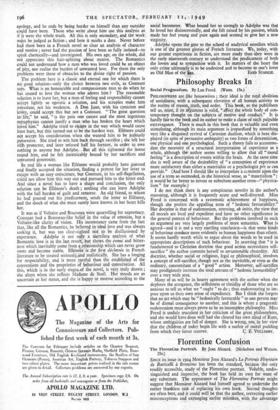Philosophy Breaks In
Social Pragmatism. By Lan Freed. (Watts. 15s.)
PHILOSOPHERS are like housewives ; their ideal is the total, abolition of untidiness, with- a subsequent elevation of all human activity to the realms of reason, truth, and order. This book, so the publiihers tell us, mutt, if its afgument is valid; " affect the whole body of con- temporary thought- on -the subjects of motive and conduct." It is hardly fair to the book and itt author to make a claim of such palpable extravagance. There is much in this book that is valuable and even stimulating, although its main argument is jeopardised by something very like a disguised revival of Cartesian dualism, which is here 'dis- played (in spite of persuasive ambiguity) as two forms of determinism, one physical and one psychological. Such a theory fails tOaCcommo- date the necessity of a structural interpretation of experience as a whole, although thle-author seems willing to allow that 'all"moral feeling" is a description of events within the brain. At the same time she is well aware of the desirability of "a conception of experience more satisfactory than either a materialist or a psychologist per se can provide." (And here I should Me to interpolate a coin/bent upon the use of a term so outmoded, in the historical sense, as " Materialism
it would be far better to invent or substitute another term—" physica- lism" for example.)
I do not think there is any conspicuous novelty in the author's reasoning, although it is frequently acute and well-directed. Miss Freed is concerned with a systematic achievement -of happiness, though she prefers the appalling term of " hedonic favourability." Her doctrine is that of eudemonism, stressing, ab initiO, the view that all morals are local and expedient and have no other significance in the general pattern of behaviour. But the problems involved in such an argument are very largely problems of mere semantics. What is agreed—and it is not a very startling conclusion—is that some kinds of behaviour conduce more evidently to human happiness than others. It seems hardly worth while to argue about -the words to be used in appropriate descriptions of Such behaviour. In asserting that "it is fundamental to Christian doctrine that good action necessitates self- sacrifice" the author commits herself to an* untenable absurdity. All doctrine, whether social or religious, legal or philosophical, involves a concept of self-sacrifice, though not at the inevitable, of even as the ordinary, concomitant of a " good " action. Moreover, self-Sacrifice may prodigiously increase the total amount of " hedonic favourability"
over a very wide area. .
Many of us will be in hearty agreement with the author when she deplores the arrogance, the selfishness or timidity of those who are so anxious to tell us what we " ought " to do ; thtis endeavouring to im-, pose upon us their own sense of expediency. But I think she forgets that an act which may be " hedonically favourable" to one person may be of dismal consequence to another, and this is where a pragmatic eudemonism must always prove to be an incomplete philosophy. Miss Freed is unduly truculent in her criticism of the great .phidosophers, 'and she would have done Well had she cleared her own mind of Kant, whose ambiguities are full of danger. She is Wrong, too, in her view that the children of today begin life with a surfeit of moral pudding






































 Previous page
Previous page